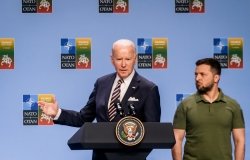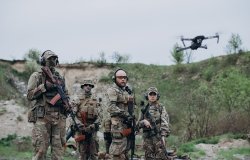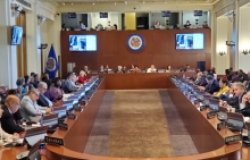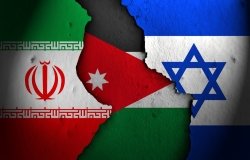Mr. Ghani Goes to Washington
"Ghani may have many friends in Washington, both inside and outside government. Ultimately, however, it is his friends (and some foes) back in Afghanistan whom he will need to lean on if the country’s many challenges are to be overcome," writes Michael Kugelman.
Ashraf Ghani’s upcoming trip to Washington, D.C., represents his first visit to the United States as Afghanistan’s president. It also marks a homecoming of sorts.
Ghani spent a number of years in the city as a World Bank official, and many within Washington’s foreign affairs and international development circles know him or have anecdotes to share about him (most of which are flattering, though some highlight his notoriously short temper). In recent weeks, I’ve heard various people speak excitedly about the return of their former colleague — a man they all still call “Ashraf.”
That Ghani has many long-standing friends in Washington is clear. However, in recent months he has likely secured a bevy of additional friends in the U.S. government and military.
Shortly after taking office in September 2014, Ghani signed a bilateral security agreement (BSA) with Washington that enabled a residual U.S. troop force to remain in Afghanistan this year. In November, he lifted a ban on night raids. These raids are deeply controversial in Afghanistan, but U.S. military officials regard them as a highly effective counterinsurgency tactic. Finally, Ghani — acknowledging the important role played by U.S. forces in Afghanistan — has called on the United States to rethink its withdrawal plan, which requires all troops to leave by the end of 2016.
This all represents a sea change of drastic proportions from the stormy era of Hamid Karzai, Ghani’s predecessor.
At first, Karzai could seemingly do no wrong in Washington’s eyes. In October 2001, he partnered closely with American special forces when international troops entered Afghanistan. Then-U.S. President George W. Bush called him a hero. Three former American presidents attended Karzai’s presidential inauguration. He impressed with his charm, impeccable manners, and fluent English.
However, the final years of Karzai’s presidency brought a rapid deterioration in U.S.-Afghan ties, culminating in shouting matches between Karzai and top U.S. officials — including Vice President Joe Biden. In one fit of pique, Karzai threatened to join the Taliban. During the final period of Karzai’s presidency, he and U.S. President Barack Obama barely spoke to each other. In the end, Karzai — who repeatedly refused to sign the BSA — simply appeared uninterested in dealing with the Americans.
Given the dysfunction during the latter Karzai years, today the only way to go is up — and the relationship is already on an upward trajectory.
Ghani’s visit to Washington promises to be warm and cordial, with little drama or controversy. His expected address to Congress — unlike that of a certain prime minister earlier this month — should enjoy bipartisan support. His meeting with Obama should find the two largely on the same page — and produce several major announcements.
One of them relates to the drawdown schedule, arguably the top agenda item for Ghani’s visit. And Obama has already indicated his willingness to make refinements.
In November 2014, he announced that instead of a complete end to U.S. combat activities in Afghanistan in 2015, some U.S. forces would continue to stage such operations on a limited basis. Expect him to announce an even bigger change with Ghani in town: Many of the 9,800 troops currently in Afghanistan will stay into 2016, instead of being reduced to 5,500, as originally planned. This decision would reflect not only long-standing concerns about the readiness of Afghan troops and a still-strong Taliban insurgency, but also newer concerns about the Islamic State’s rising profile in Afghanistan. In January, the militant group announced that it had formally expanded its presence into Afghanistan — and appointed a former Afghan Taliban leader as one of its top officials there. The troop decision would also underscore the White House’s much-improved relationship with Kabul; Obama likely would not have agreed to such a change if Karzai was still in power.
However, Obama is unlikely to budge on his vow to have all U.S. troops out of Afghanistan after 2016. He wants to cement his legacy as an anti-war president who brought all U.S. troops home from Afghanistan. At any rate, post-2016 considerations will be mere abstractions during his meeting with Ghani. The focus will be on this year and next, and Ghani would presumably be pleased with Obama’s expected decision to carry over the current troop numbers into next year.
Other top agenda items should also find the two leaders in agreement. Ghani will likely brief U.S. officials on recent efforts to launch peace talks with the Taliban. Tellingly, two of Ghani’s first foreign trips as president were to Pakistan and China — two key players in the latest effort to spark talks. Given its overarching strategic interest in a stable Afghanistan, the United States will support any efforts toward peace, even if Islamabad and Beijing, and not Washington, assume the prime intermediary roles. Washington is no doubt pleased about Ghani’s intensified engagement with Pakistan on this front — and on the issue of cross-border terrorism as well. However, Obama should urge Ghani to keep India fully informed about any reconciliation efforts. New Delhi is a close friend of Kabul, and may be nervous about Ghani’s intensified dealings with neighboring countries that are India’s rivals (Ghani is expected to visit India in several weeks).
Another key agenda item during the Ghani visit will be Afghanistan’s economy. The United States and Afghanistan are expected to announce a reworked economic partnership meant to ensure more effective aid delivery to Afghanistan. International economic assistance (much of it from the United States) accounts for 65 percent of Afghanistan’s annual budget, so this is no small matter. Additionally, a core objective of Ghani’s visit is to secure concrete assurances of a continued U.S. commitment to his country. A revamped economic partnership, coupled with a White House decision to retain a strong troop presence next year, would allow Ghani to return home with his mission accomplished.
Unfortunately, that won’t bring Ghani any closer to accomplishing more challenging missions back home — which range from the Taliban insurgency and corruption to economic malaise. Many Afghans would be reassured if Washington decides to retain 2015 troop levels next year, but that decision could also harden the Taliban’s resolve to fight (if its propaganda is to be believed, the Taliban won’t stop fighting until all U.S. troops are out of the country).
Also, reconciliation with the Taliban is a very tall order. There is little indication that the group — and particularly its top leadership — is fully on board. Pakistan’s ability and desire to pressure the Taliban to step off the battlefield may be overstated. In recent days, Ghani has experienced domestic pushback as well, including from leaders once associated with anti-Taliban militia groups. Many politicians in Afghanistan have cautioned Ghani against supporting a peace process that involves Pakistan, highlighting the deep mistrust that remains between the two countries, and underscoring the fragilities of recent gains in Afghanistan-Pakistan relations.
Additionally, Afghanistan’s economy is deeply troubled. The country’s Central Statistics Organization (CSO) has acknowledged that the government’s term so far has been dominated by stagnation and rising inflation. According to the CSO, the national inflation rate has grown by one point, and Afghan purchasing power has decreased. Declines in Afghan currency values have triggered price increases in local commodities markets. Even with continued — and more effective — U.S. assistance, easing Afghanistan’s economic stress will be difficult.
Looming over these challenges is a more fundamental, though no less urgent, concern: Afghanistan still does not have a full government. Nearly six months after Ghani took power, many of its cabinet ministries remain leaderless. This greatly complicates the development of coordinated and coherent policies, and decreases the likelihood of progress on challenges large and small alike. Consequently, Afghans’ patience could quickly wear thin with their government — one that they did not elect. Last year, they braved Taliban threats to vote for a single leader, not for a unity government arrangement that emerged from U.S.-brokered negotiations to resolve an election stalemate.
Perhaps, then, the best advice Obama can give Ghani is to form his cabinet as expeditiously as possible. (To be sure, Obama has faced these challenges with his own cabinet, though not to the extent that Ghani has.)
Ghani may have many friends in Washington, both inside and outside government. Ultimately, however, it is his friends (and some foes) back in Afghanistan whom he will need to lean on if the country’s many challenges are to be overcome.
The opinions expressed here are solely those of the author.
About the Author


Indo-Pacific Program
The Indo-Pacific Program promotes policy debate and intellectual discussions on US interests in the Asia-Pacific as well as political, economic, security, and social issues relating to the world’s most populous and economically dynamic region. Read more










